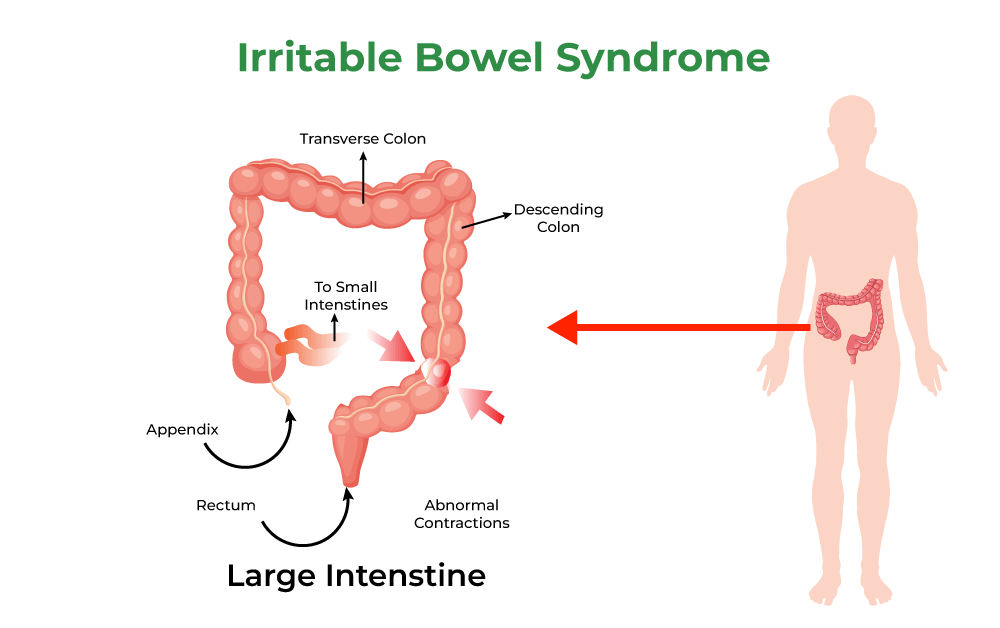Irritable Bowel Syndrome (IBS)
24+ years of experience 20,000+ patients treated. Insurance facilities are available for laparoscopic Irritable Bowel Syndrome (IBS) repair.
What are IBS?
Irritable Bowel Syndrome, often abbreviated as IBS, is a common disorder affecting the large intestine. It typically causes symptoms such as cramping, abdominal pain, bloating, gas, and irregular bowel movements. IBS can vary significantly in severity and symptoms but doesn’t cause changes in bowel tissue or increase your risk of colorectal cancer.

Types of Irritable Bowel Syndrome
Irritable Bowel Syndrome (IBS) is classified into different types based on the most common symptoms experienced by the patient. Understanding these types helps in targeting treatment more effectively. Here are the main types of IBS:
- 1.IBS with Constipation (IBS-C)
- 2.IBS with Diarrhea (IBS-D)
- 3.Mixed IBS (IBS-M)
- 4.Unsubtyped IBS (IBS-U)
IBS with Constipation (IBS-C): This type is characterized primarily by chronic constipation. Patients may experience hard, lumpy stools, infrequent bowel movements, and a sensation of incomplete evacuation. It’s essential for those suffering from IBS-C to manage their diet and use specific IBS constipation diet plans.
IBS with Diarrhea (IBS-D): Opposite to IBS-C, IBS-D is marked by frequent, loose, or watery stools. People with this subtype often experience urgency, abdominal pain, and discomfort. Managing IBS-D involves dietary adjustments and medications to control diarrhea.
Mixed IBS (IBS-M): In IBS-M, individuals experience alternating symptoms of both constipation and diarrhea. This type can be particularly challenging to manage because dietary and medicinal treatments may differ based on the symptom phase.
Unsubtyped IBS (IBS-U): This less common type is for those whose symptoms do not predominantly align with constipation or diarrhea. The symptoms are inconsistent and don’t fit neatly into the other categories.
Each type of IBS requires a tailored approach for management, focusing on dietary changes, lifestyle adjustments, and sometimes medication. Recognizing the specific IBS symptoms and subtype can significantly enhance the quality of life and reduce the severity of symptoms for those affected by this irritable bowel disease.
Treatments for Irritable Bowel Syndrome
Lux Hospital offers comprehensive treatment options for Irritable Bowel Syndrome (IBS), addressing various symptoms and providing relief to patients. Our specialized care includes:
Medication for IBS
Lux Hospital provides a range of IBS medications, including fiber supplements, laxatives, and antidiarrheal drugs, tailored to individual needs.
Dietary Management
Our expert team guides patients in adopting the low FODMAP diet for IBS, helping to identify and eliminate trigger foods.
Psychological Support
Lux Hospital offers psychological therapies, such as stress management, to address the mind-gut connection and alleviate symptoms.
Advanced Therapies
We utilize innovative treatments like biofeedback to help patients gain better control over their symptoms and improve bowel function.
Holistic Approach
Lux Hospital takes a holistic approach to IBS treatment, considering the individual’s overall health and lifestyle factors to develop personalized care plans.
With Lux Hospital’s multidisciplinary approach and cutting-edge therapies, patients can effectively manage their irritable bowel syndrome and experience improved quality of life.
Why Lux
At Lux Hospitals, we specialize in a patient-centered approach to managing IBS. Our gastroenterologists are experts in diagnosing and treating various forms of irritable bowel disease. We offer tailored treatment plans, including the latest IBS medications and dietary management strategies. Lux Hospitals also provide psychological support and advanced therapies such as biofeedback for those with chronic symptoms, making it the best place for comprehensive IBS treatment. Using a holistic and advanced approach, Lux Hospitals remains a leader in the treatment of Irritable Bowel Syndrome, ensuring each patient receives the most effective care tailored to their specific needs.
Causes of Irritable Bowel Syndrome
Understanding the causes of Irritable Bowel Syndrome (IBS) is essential for effective management and treatment. While the exact causes of IBS are not fully understood, several factors may contribute to its development:
- Muscle Contractions: Abnormal muscle contractions in the intestine can lead to cramping, bloating, and changes in bowel habits characteristic of IBS.
- Nervous System Abnormalities:Dysfunction in the nervous system that controls the digestive tract may play a role in IBS, resulting in heightened sensitivity to abdominal pain and discomfort.
- Inflammation: Low-grade inflammation in the intestines may trigger symptoms of IBS, although the inflammation itself is not typically severe enough to be detected through standard diagnostic tests.
- Gut Bacteria: Changes in the balance of gut bacteria (microbiota) may contribute to IBS symptoms, affecting digestion and bowel function.
- Severe Infection: A history of severe gastrointestinal infection or illness can sometimes precede the onset of IBS symptoms, suggesting that infections may trigger or exacerbate the condition.
By addressing these potential contributing factors, individuals with IBS can work with healthcare providers to develop personalized treatment plans that effectively manage symptoms and improve overall quality of life.
Symptoms of Irritable Bowel Syndrome
Recognizing the symptoms of Irritable Bowel Syndrome (IBS) is crucial for timely diagnosis and effective management. Common symptoms of IBS include:
Abdominal Pain and Cramps: Persistent abdominal pain or discomfort, often relieved by passing a bowel movement, is a hallmark symptom of IBS.
Changes in Bowel Habits: Individuals with IBS may experience constipation, diarrhea, or a combination of both, with bowel habits fluctuating over time.
Bloating and Gas: Excessive bloating and gas are frequent complaints among those with IBS, leading to discomfort and abdominal distension.
Urgency to Use the Bathroom: People with IBS often feel a sudden and urgent need to have a bowel movement, which can be challenging to control.
Feeling of Incomplete Evacuation: Despite having a bowel movement, individuals with IBS may still experience a sensation of incomplete evacuation.
By recognizing these IBS symptoms, individuals can seek appropriate medical evaluation and treatment to manage their condition effectively and improve their quality of life.
Tips to Prevent Irritable Bowel Syndrome
Preventing Irritable Bowel Syndrome (IBS) symptoms involves adopting certain lifestyle changes and dietary habits. Here are some tips to prevent IBS:
Follow a Low FODMAP Diet: Reduce symptoms by avoiding foods high in fermentable oligosaccharides, disaccharides, monosaccharides, and polyols (FODMAPs).
Stay Hydrated: Drink plenty of water throughout the day to maintain proper hydration and support healthy digestion.
Manage Stress: Practice stress-reducing techniques such as meditation, deep breathing exercises, or yoga to minimize the impact of stress on gut health.
Regular Exercise: Engage in regular physical activity to promote bowel regularity and overall well-being.
Eat Smaller, Frequent Meals: Opt for smaller, more frequent meals rather than large, heavy meals to prevent overeating and reduce the risk of triggering IBS symptoms.
Limit Trigger Foods: Identify and avoid foods that commonly trigger IBS symptoms, such as spicy foods, fatty foods, caffeine, and alcohol.
Probiotics: Incorporate probiotic-rich foods or supplements into your diet to promote a healthy balance of gut bacteria.
By incorporating these IBS prevention tips into your daily routine, you can reduce the frequency and severity of symptoms and improve your overall quality of life.
Conclusion
Lux Hospitals provides comprehensive, personalized treatment for Irritable Bowel Syndrome (IBS), led by expert gastroenterologists and utilizing advanced therapies. Our holistic approach includes medication management, dietary guidance, and psychological support to effectively manage your symptoms and enhance your quality of life. Don’t let IBS control your daily routine. Contact Lux Hospitals today to schedule a consultation and start your journey towards better digestive health.
Excellence in Patient Care
We are proud to provide exceptional support to our patients, ensuring they receive the highest quality care and attention. Our award-winning services include:
End to End Patient Care from Lux.
Experienced Medical Staff
Patient-Centered Services
Trusted Health Solutions
Find a Doctor
Expertise you can trust, Meet our esteemed doctors who bring exceptional knowledge, compassion, and innovation to provide top-notch care for your health and well-being.

Dr. Abhishek
MBBS, MS, FMAS, FISCP, DMAS
Consultant Colorectal & Laparoscopic Surgeon, Proctologist
Experience : 25 years

Dr. Samhitha
MBBS, MS, FMAS, FISCP, DMAS
Consultant Colorectal & Laparoscopic Surgeon, Proctologist
Experience : 7 years
What Are People Saying About Us in Google
Embark on a journey of inspiration and hope with our patient success stories, complemented by informative videos from our dedicated doctors.










